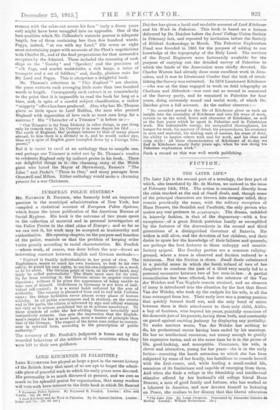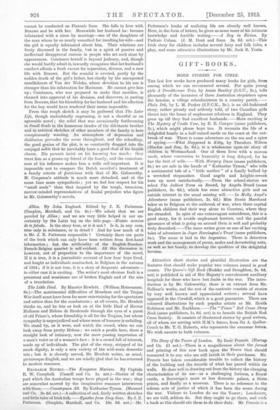FICTION.
THE LATER LIFE" The Later Life is the second part of a tetralogy, the first part of which, also translated by Mr. de Mattos, we noticed in the issue of February 14th, 1914. The action is continued directly from the crisis reached at the end of Small Souls, and, though some of the principal characters are thrown into stronger relief, they remain practically the same, with the solitary exception of Hans Brauws, the Socialist and Pecificist, the only person who makes any real pretence to eeraaaeueia. The drama, unfolded in leisurely fashion, is that of the degeneracy with a few exceptions—of a great Dutch patrician family as exemplified by the fortunes of the descendants in the second and third generations of a distinguished Governor of Batavia. His widow is still alive, and the devotion of her children, and their desire to spare her the knowledge of their failures and quarrels, are perhaps the best features in these unhappy and unsatis- factory epigoni. Her Sunday parties are a common rallying- ground, where a truce is observed and friction reduced to a minimum. But the friction is there. Small Souls culminated in a painful scene in which the harsh refusal of two of her daughters to condone the past of a third very nearly led to a personal encounter between two of her sons-in-law. A partial reconciliation has been effected, but the relations of the Van der Welekes and Van Naghels remain strained, and an element of irony is introduced into the situation by the fact that Henri Van der Weloke, who took up the cudgels for his wife, is all the time estranged from her. Their early love was a passing passion that quickly burned itself out, and the only bond of union between them is their attachment to their only child, Addle, a boy of fourteen, wise beyond his years, painfully conscious of the domestic jars of his parents, loving them both, and constantly on guard against exciting jealousy by displaying any partiality. To make matters worse, Van der Weloke has nothing to do, his professional career having been ended by his marriage. He has no intellectual resources, not money enough to gratify his expensive tastes, and at the same time he is in the prime of life, good-looking, and susceptible. Constance, his wife, is clever and attractive, young for her years--she is in the early forties—resenting the harsh ostracism to which she has been subjected by some of her family, too fastidious to console herself with the first-comer, and, while leading a small-souled life, conscious of its limitations and capable of emerging from them. And when she finds a refuge in the friendship and intellectual stimulus offered by her husband's old college friend Hans Brauws, a man of good family and fortune, who has worked as a labourer in America, and now devotes himself to lecturing on Peace, she realizes to her dismay that this liberal education • The Later Mt.. By Louie Copperus. Translated by Alexander Teixeira de Beam London ; William Heinemann. [Os.] cannot be conducted on Platonic lines. She falls in love with Brauws and he with her. Meanwhile her husband ha I become infatuated with a niece by marriage—one of the daughters of the man whom he so nearly assaulted for insulting his wife—and the girl is equally infatuated about him. Their relations are freely discussed in the family, but in a spirit of passive and ineffectual disapproval curious in people who set such store by appearances. Constance herself is beyond jealousy, and, though she would hardly admit it, inwardly recognizes that her husband's conduct affords a fresh excuse for separation, divorce, and a new life with Brauws. But the scandal is averted, partly by the sudden death of the girl's father, but chiefly by the unexpected unselfishness of Van der Weleke, whose devotion to his son is stronger than his infatuation for Marianne. He cannot give him up ; Constance, who was prepared to make that sacrifice, is shamed into approval of his decision, and discovers, in parting from Brauws, that his friendship for her husband and his affection for the boy would have rendered their union impossible.
From this rough sketch it may be gathered that The Later Life, though undoubtedly engrossing, is not a cheerful or an agreeable novel ; the relief that was occasionally forthcoming in Small Souls in the humorous tirades of the dilettante brother and in• satirical sketches of other members of the family is here conspicuously wanting. An atmosphere of depression and disillusion pervades the scene throughout, and the schoolboy, the good genius of the plot, is so constantly dragged into the conjugal talk that he inevitably loses a good deal of his boyish charm. His parents insist on his knowing too much : they treat him as a grown-up friend of the family, and the conscious- ness of his influence makes him a trifle self-important. It is impossible not to compare the Dutch novelist's treatment of a family coterie of slatricians with that of Mr. Galsworthy. M. Couperus's attitude is much more detached, and at the same time more sympathetic ; yet we feel less respect for his "small souls" than that inspired by the tough, tenacious, narrow-minded representatives of feudal prejudice who figure in Mr. Galtsworthy's novels.



































 Previous page
Previous page